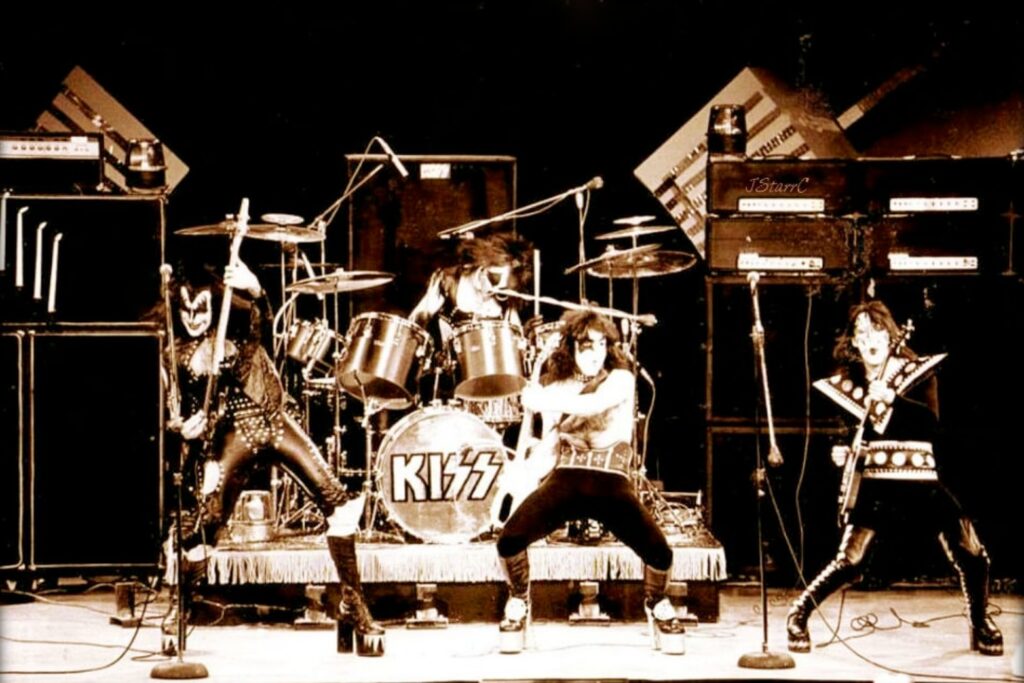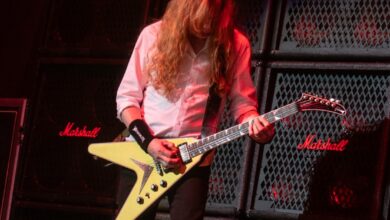Ace Frehley and KISS Reignited Rock History with a Fiery “Black Diamond” on The Midnight Special
That night on The Midnight Special, when KISS walked onto the Burbank NBC stage to deliver “Black Diamond,” the air already felt electric. It was July 11, 1975 — and by then the band had built enough of a reputation for spectacle that they knew how to push cameras and audiences. The set was intimate but theatrical, a studio frame drenched in drama, and “Black Diamond” was the climactic shot — a closing track from their debut that carried both promise and danger. The performance became the crown jewel of their televised legacy, merging their sound and spectacle into one unforgettable moment.
From the first chord, “Black Diamond” felt like something far more than a song — it was a declaration. The quiet acoustic intro offered a deceptive calm before the eruption. When Paul Stanley’s soft vocal dissolved into the growl of distorted guitars, the transformation was stunning. The lights flared, the sound thickened, and the crowd found itself trapped between fascination and awe. It wasn’t just the noise; it was the presence. KISS looked like they had stepped out of a comic book and into America’s living rooms.
Peter Criss took over the lead vocal and turned the track into a miniature drama. His rasp carried both melody and muscle, a perfect match for the track’s dual nature — gentle one second, explosive the next. Behind him, Gene Simmons’ bass rumbled like a war engine, and Paul Stanley kept the rhythm razor sharp. The transition from serenity to sonic chaos showcased a band that understood dynamics like a scriptwriter understands suspense. They didn’t just play “Black Diamond”; they built it, layer by layer, until it towered over the audience.
Ace Frehley’s solo on that night remains one of those performances guitarists still slow down to study. His phrasing was pure instinct — fluid, fierce, and melodic without pretense. Every bend and slide carried intention, every pause created tension. Television in the 1970s couldn’t capture the full power of the sound, yet somehow Ace’s tone cut through like a blade. It was silver fire — the kind of guitar work that made even those who doubted KISS’s musicianship stop and pay attention.
The beauty of The Midnight Special format was its honesty. There were no pyrotechnic crutches, no stadium echo to hide behind. It was live television, close-up and unforgiving. KISS met that challenge head-on. The camera lingered on the musicians’ faces, amplifying their intensity. You could see Paul’s eyes flick toward Gene, Peter counting the beat on his hi-hat, Ace leaning back into his own orbit. For a band that thrived on spectacle, it was raw, real, and mesmerizing.

The choreography — those synchronized struts and head tosses — added another layer of magic. What critics once mocked as over-the-top suddenly looked precise, almost balletic. Each move aligned perfectly with the rhythm, as if the band were animating their own soundtrack. “Black Diamond” wasn’t just being performed; it was being painted across the stage with motion and rhythm. It turned the NBC studio into a microcosm of the arenas they would soon dominate.
“Black Diamond” aired later than “Deuce” and “She,” almost as a grand finale, and that choice mattered. By the time viewers saw it, the legend was already building. KISS had ignited curiosity with earlier broadcasts, but “Black Diamond” solidified their status. It was the track that showed America that behind the flames and makeup lay precision, discipline, and musicianship. The song moved like a machine, each part interlocking with the next — as fierce as it was flawless.
The rhythm section drove the entire piece. Gene and Peter built a foundation thick enough to support the chaos on top. The groove was relentless, the drumming tight and forceful, and the basslines heavy but melodic. Together, they made “Black Diamond” feel less like a song and more like a ritual. It was primal, hypnotic, and undeniably magnetic. The studio audience might have been seated, but you could feel the collective heartbeat quicken as the performance peaked.
Then came the outro — that haunting slowdown where the song seems to collapse under its own power. The lights dimmed, the tempo dragged into something cinematic, and the band let it disintegrate beautifully. That moment sealed the performance’s legend. Most bands would end with fireworks; KISS ended with gravity, pulling everyone back down to earth before disappearing into silence. It was bold and unforgettable.
For Ace Frehley, this performance became part of his myth. His style was more than technical skill — it was feel, attitude, and instinct. That night’s solo immortalized him on American television as the quiet ace who could make his guitar speak louder than pyrotechnics ever could. Watching it now, it’s impossible not to feel a chill, knowing that his cosmic journey came to an end in October 2025. At seventy-four, the Space Ace left the world as one of rock’s most distinctive voices — not just through words, but through strings and distortion.
Rewatching The Midnight Special today, Ace’s presence feels almost otherworldly. The same grin, the same energy — only now, each frame carries the weight of finality. That outro solo, once a thrill, has become a farewell. It’s not just nostalgia; it’s reverence. The performance stands as living proof of his artistry, captured forever in that smoky NBC studio where the stars seemed close enough to touch.
“Black Diamond” now feels like prophecy fulfilled. The song’s themes — struggle, endurance, transformation — mirror the band’s entire story and Ace’s journey within it. From local New York clubs to national television, from masked anonymity to immortality, the trajectory feels complete. Every chord from that night echoes with the spirit of a man who turned noise into beauty and made outer space feel like home.
In a world of hyper-edited, overproduced performances, “Black Diamond” endures because it’s real. It’s unfiltered rock ‘n’ roll, played by a band on the edge of explosion. Even decades later, the footage doesn’t age; it vibrates. Each crash of cymbals, each burst of feedback, is a time capsule of a genre and a generation learning to roar.
KISS’s “Black Diamond” on The Midnight Special remains one of the greatest televised rock moments ever — raw, fiery, and fearless. It captured a band at its hungriest and a guitarist at his most brilliant. And now, with Ace Frehley’s passing, it’s more than just a performance. It’s a monument — a four-minute transmission from the night rock and roll reached the stars and left its brightest one among them.





